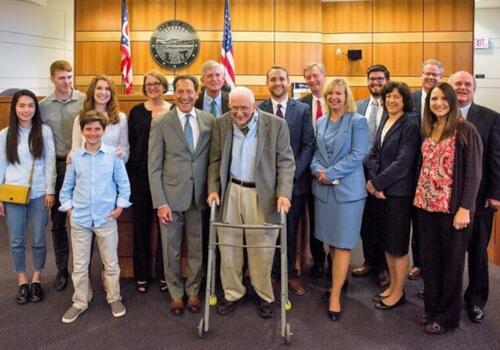Appellate Court Upholds $31 Million Award Against Oberlin In Mob Action Against Family Grocery
A unanimous three-judge panel of the Ohio Court of Appeals handed down a long-awaited decision last week in the case of Gibson’s Bakery v. Oberlin College. The court dismissed all of Oberlin’s appellate claims and confirmed the jury’s finding that the college, a small private liberal arts institution in rural Ohio, was liable for libel, intentional infliction of emotional distress, and intentional interference with a business relationship.
It then upheld the lower court’s award to Gibson’s Bakery of $25 million in damages and $6.2 million in attorney’s fees. (The trial judge had reduced the jury’s original award of $11.1 million in compensatory damages, $33.2 million in punitive damages.)
“The Gibson family appreciates the Court of Appeals’ thorough and thoughtful analysis which rightly rejected all of Oberlin College’s and Dean Raimondo’s challenges on appeal.”
The NAACP characterized the trial ruling as an attack on civil rights. Media organizations and free speech groups said it would have chilling effects, especially on the First Amendment rights of students.
The appeals court alluded to those claims in the Friday ruling, but said the case had nothing to do with students’ First Amendment rights.
Jonathan Turley details the background leading up to this decision and his thoughts…
Starting in 2017, I have written half a dozen columns on the lawsuit against Oberlin College over its participation in a campaign against a small family-owned business accused of racism. In this case, the college not only joined the mob but helped lead the mob against Gibson’s Bakery. Even after a massive award by the jury, Oberlin President Carmen Twillie Ambar continued to refuse to apologize for the shameful and costly conduct of his administration. Now, an appellate court has upheld a $25 million judgment against the small college and Oberlin earned every penny of that penalty. Ambar still remains the president of the college.
This controversy began with a shoplifting case. In 2016, an African American student named Jonathan Aladin was caught trying to steal a bottle of wine from Gibson’s Bakery, which was established in 1885 and has been closely tied to the college for over a century. When the grandson of the owner tried to stop Aladin, a fight ensued and police were called. Aladin and two other students, Cecilia Whettstone and Endia Lawrence, were arrested. Students, professors, and administrators held protests, charging that the bakery was racist and profiled the three students.
Oberlin maintained in court filings that the son and grandson of the owners of Gibson’s Bakery “violently and unreasonably attacked” an unarmed student, but that is not how the police viewed it. Aladin was charged with robbery, which is a second degree felony, and Whettstone and Lawrence were charged with first degree misdemeanor assault.
Police rejected claims of a racial motive and noted that, over a period of five years, 40 adults were arrested for shoplifting at Gibson’s Bakery, but only six were African American.
It also is not how the court viewed it.
When prosecutors cut a plea deal to reduce the charge to attempted theft, a local judge refused. He said the plea deal appeared to be the result of a permanent “economic sanction” by the college in which the victim had little choice but to relent. Ultimately, all three students pleaded guilty.
The merits of the case did not seem to bother Oberlin officials or student protesters. Dean of Students Meredith Raimondo reportedly joined the massive protests and even handed out a flier denouncing the bakery as a racist business. When some people contacted Oberlin to object that the students admitted guilt, special assistant to the president for community and government relations Tita Reed wrote that it did not change a “damn thing” for her. Reed also reportedly participated in the campus protests.
Other faculty members encouraged students who denounced the bakery.
The chairman of Africana studies posted, “Very proud of our students!” Oberlin barred purchases from the bakery, pending its investigation into whether this was “a pattern and not an isolated incident.” Raimondo also pressured Bon Appetit, a major contractor with the college, to cease business with the bakery. Reed even suggested that “once charges are dropped, orders will resume” and added that she was “baffled by their combined audacity and arrogance to assume the position of victim.”
The jury in June 2019 awarded the Gibsons $44 million in compensatory and punitive damages. A judge later reduced the award to $25 million. That was just upheld and the appellate court also upheld an award of $6.2 million payment in attorney fees. That comes to $31.2 million not including millions spent by the college to fight this case. If you add the same fees for the college, it comes to $37.4 million in fighting this case by Oberlin.
What is most striking about this case is the utter lack of accountability or remorse on the part of Oberlin. Notably, even after record judgments against the college, officials like Raimondo remained at the college and faced no apparent sanctions for their conduct. (Raimondo recently left the college).
President Ambar would not even apologize to this family. The two patriarchs of the family died during the course of this litigation.
Yet, the college itself is also a victim. The tens of millions of dollars lost by Oberlin could have given hundreds of students free tuition at the school. It could have sustained major research grants and programs. Instead, college officials burned through the money rather than stand up to a mob.
Here is the opinion: Gibson Bros. v. Oberlin
Tyler Durden
Tue, 04/05/2022 – 11:46

